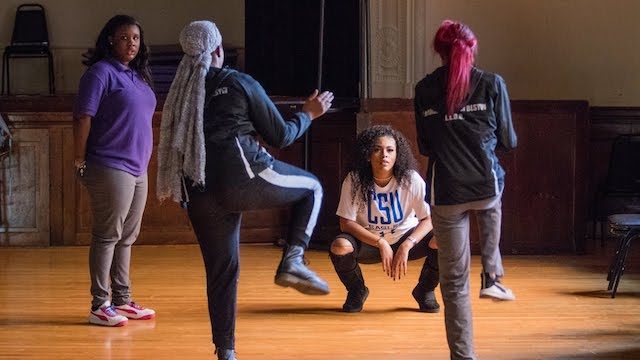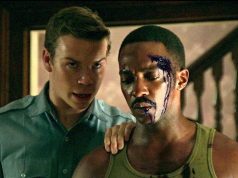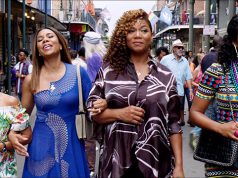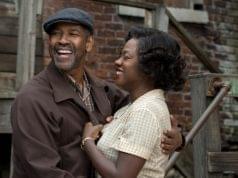
“Step” is ostensibly a documentary about an inner-city high school’s step-dancing team, but this crowdpleaser is more focused on the students’ academic pursuits and struggle to break the poverty cycle. Issues related to race, class, and gender are likewise addressed by director Amanda Lipitz, all in a tight, inspiring, 84-minute package sure to lift even the heaviest spirits of even the most dance-disinterested.
The setting is the Baltimore Leadership School for Young Women, a public charter school that opened in 2009 with the ambitious goal that all 120 of its incoming students — then sixth-graders, most (all?) of them African American — would graduate with college acceptance letters in hand. “Step” chronicles their senior year, spotlighting three members of the step-dancing team who represent BLSYW’s first graduating class.
First is Blessin (the viewer must agree not to make fun of the names), a strikingly beautiful and outgoing girl who founded the step team back in 2009. She’s smart, but she hasn’t applied herself academically, and she has a temper. Her mother suffers from depression, which impacts her ability to be supportive. Blessin’s mom went to college herself for two years before withdrawing. “I should have stayed,” she says simply and regretfully.
Then there’s Cori, a whip-smart, competitive girl who hopes to get in to Johns Hopkins. She idolizes her mother, who was pregnant with her at 15 but has worked hard to provide for her family.
Finally, we meet Tayla, a diva-in-training (she describes herself in Beyonce terms) with an embarrassing stage mom who comes to step practice and knows the routines better than Tayla does. (Incidentally, Tayla’s mom works for the Department of Corrections, a surprisingly serious job for someone who seems like the “fun mom” of the group. The film observes the dichotomy without dwelling on it, adding color to the overall picture.)
Lipitz tracks these girls over the 2015-2016 school year. The recent death of Freddie Gray at the hands of Baltimore police has cast a pall over this community of mostly lower-income black students, some of whom, on top of homework and extracurriculars and a social life, struggle with not having enough food to eat. Lipitz presents their stories with dignity and affection, never exploitation; the director is as eager to see them succeed as we are.
What struck me most is how the film portrays the strength and sisterhood of black women. All three of the main girls are close to their mothers (their fathers are out of the picture), as well as to each other and to the school’s tirelessly dedicated guidance counselor, Ms. Dofat, who supplies them with hugs and advice and is perhaps single-handedly responsible for getting some of them into college. The moms confer with Ms. Dofat and one another about the girls’ needs, everyone seemingly on the same page: they need to get good grades, graduate, and escape this life. There’s a powerful camaraderie here, the women and girls disregarding (usually) whatever differences they have in favor of encouraging one another. You can see the compassion and empathy in the way they interact, the tacit acknowledgement of “we’re all in this together.”
Intermingled with the ups and downs of this drama is the story of the step team, underdogs (of course) who, at year’s end, will have their last chance to win their first championship. I won’t spoil the outcome of the contest or of BLSYW’s goal of universal matriculation and college acceptance, but Lipitz covers all angles with a satisfying storyteller’s gusto. Any documentary that makes you feel optimistic about the rising generation, female empowerment, strong mothers and daughters, or overcoming economic disparity should be celebrated.
B+ (1 hr., 24 min.; )





